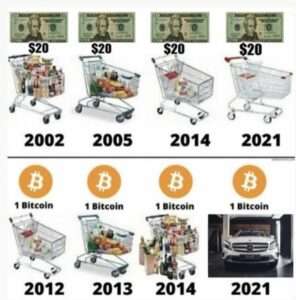Problems Bitcoin Solves
You go to fill up your car, and the pump’s ticking higher than last month. That $20 bill in your wallet used to buy a decent dinner; now it barely covers a burger and fries. This isn’t your imagination—it’s fiat money losing its mojo, thanks to endless printing. Governments and central banks can churn out cash whenever they please, and every new dollar dilutes the ones you’ve got. Since 2000, the U.S. dollar’s lost about 40% of its purchasing power—meaning your savings are melting away even if you don’t touch them. Bitcoin flips this nightmare on its head. With a hard cap of 21 million coins, it’s like a vault with a lock no one can pick. No printing press can flood it, so its value doesn’t just hold—it grows as demand climbs. For regular folks, that’s a lifeline: money that fights back against the rising cost of living.

Then there’s the chokehold of centralization. Picture your paycheck—it doesn’t just land in your hands; it’s funneled through banks that skim fees, governments that tax it, and rules that say where it can go. Ever tried sending cash to a cousin overseas? You’re hit with delays, paperwork, and a chunk carved out by some faceless middleman. Worse, those same banks can freeze your account, or a government can decide your savings aren’t yours anymore—just ask anyone who’s lived through a currency crisis. Bitcoin turns this on it’s head. It’s decentralized, running on a global network of computers no one owns. You don’t need a bank’s permission to move it, and no politician can seize it with a pen stroke. It’s your wealth, your rules—a radical shift that hands control back to you, whether you’re a barista in Ohio or a farmer in Bolivia.
Now let’s talk accessibility, because this is where Bitcoin gets personal for billions. Over 1.7 billion people worldwide don’t have a bank account—think of the street vendor in Nairobi or the laborer in rural India. They’re locked out of loans, savings, or even safe ways to get paid, all because they don’t fit the system’s mold. Add in folks under oppressive regimes—places like Venezuela, where inflation’s so bad a loaf of bread costs a wheelbarrow of cash—and the picture’s bleak. Bitcoin cracks that wide open. All you need is a phone and internet, and you’re in. No ID, no brick-and-mortar branch, just a digital key that lets you store, send, or receive value anywhere. It’s a game-changer for the unbanked, turning a cheap smartphone into a ticket to financial freedom, and for those under tyrants, it’s a way to hide wealth from prying hands.
This isn’t just about problems—it’s about solutions that hit home. Inflation’s a thief in the night, but Bitcoin’s scarcity is your shield; centralization’s a cage, but Bitcoin’s your key; exclusion’s a wall, but Bitcoin’s a bridge. Take that house you’ve been eyeing: in fiat, it’s $300,000 today, $600,000 in ten years. In Bitcoin, it might be 5 BTC now, maybe 0.1 BTC later, because its value rises while fiat sinks. Whether you’re scraping by or dreaming big—this is empowerment. It’s not charity or a handout; it’s a tool to fight a system that’s been stacking the deck against us. Bitcoin solves what fiat broke, and it does it for you, no matter where you stand.
Bitcoin is more than tech—it’s a fix for the frustrations we live every day. It’s hope for the cashier who can’t save enough, freedom for the refugee starting over, and defiance for anyone fed up with being a pawn. From Bitcoin’s origin to today’s fights against shrinking dollars, overbearing banks, and locked-out lives. It’s the “why” behind the revolution—a promise that your money can be yours again, and a future where we all win, not just the suits at the top.
